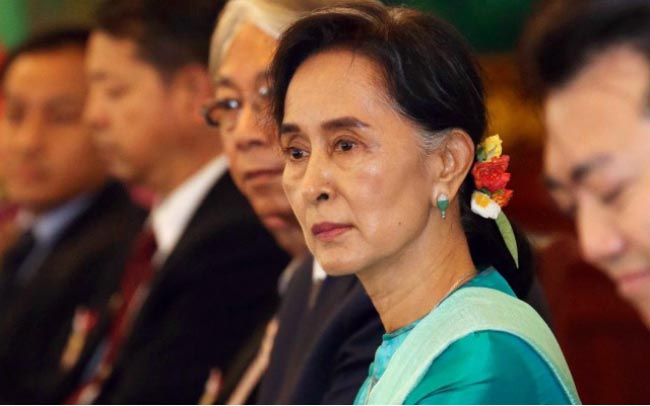The “ethnic cleansing” and flagrant violation of the fundamental rights of Rohingya Muslims in Myanmar on the one hand, and the silence of a Noble Laureate Aung San Suu Kyi on the other hand, have outraged the collective conscience. The heartrending tears of women and children and soulful reports regarding the merciless killings of Rohingya Muslims under the watch of Suu Kyi triggered an outpouring of grief. The UN and other human rights organizations have warned that the mass exodus following killings, rapes, and burned villages are signs of “ethnic cleansing”, pleading for the international community to put pressure on Suu Kyi and her government to end the violence.
UN human rights chief Zeid Ra’ad al-Hussein described it as “a textbook example of ethnic cleansing” in the wake of systematic killings and violent acts of Myanmar security forces. A number of laureates challenged the Myanmar’s de facto leader Suu Kyi to recognize the suffering of the Rohingya – a Muslim ethnic group in Buddhist-majority Myanmar.
Aung San Suu Kyi, who was under house arrest for more than two decades by the Myanmar’s military junta, showed great fortitude and refused to surrender to junta even when her husband was dying abroad and was called as “one of the most extraordinary examples of civil courage in Asia”. Able to travel freely to Norway after 21 years, Suu Kyi made a wide-ranging, deeply personal lecture, which touched on her feelings of isolation under house arrest, the Buddhist concept of suffering, human rights and her hopes and fears for her country’s future, and the importance of the peace prize itself. “What was more important,” she said in her Noble Lecture, “the prize had drawn the attention of the world to the struggle for democracy and human rights in Burma. We were not going to be forgotten. When the Nobel committee awarded the peace prize to me, they were recognizing that the oppressed and the isolated in Burma were also a part of the world, they were recognizing the oneness of humanity … The Nobel peace prize opened up a door in my heart.”
Despite the fact that she spoke about human rights and fought for democracy in Myanmar, now Suu, along with Myanmar officials, refuses to use the word “Rohingya” and might believe that they are outsiders which prompted the public to call Suu to be stripped of her Nobel. Notwithstanding the mass killings, Suu kept silent. Worst of all, she maintained that the Rohingya are illegal immigrants from Bangladesh. She also blamed international aid groups and complained about “a huge iceberg of misinformation” aiming to help “the terrorists” — presumably meaning the Rohingya. When a Rohingya woman recounted how her husband had been shot dead and how she and three teenage girls had been gang-raped by soldiers, Suu mocked the claims, on her Facebook page, as “fake rape.” Condoning the butchery of Buddhist majority is unacceptable for the world.
According to the UN reports, 400,000 Rohingya have fled the state of Rakhine in western Myanmar since August 25 in the wake of indiscriminate violence against civilian populations. Heart-wrenching stories about the gory incidents, horrific issues of murder, and appalling human right crisis of Rohingya men, women, and children are cited in international media. Rohingya Muslims suffer in the worst possible way.
The Myanmar military would embark on several campaigns to ethnically cleanse the nation of the Rohingya following 1948, when the British left Myanmar, despite the claims that the Rohingya have deep historical and ancestral roots within the pre-colonial borders of Myanmar.
With the series of violent acts, rape, and arson attacks, which have inflicted indescribable sufferings upon Rohingya women and children, the world expects Suu Kyi to remind the words spoken in her Noble Lecture that “the oppressed and the isolated in Burma were also a part of the world”. They are parts of the world and should, similar to other individuals, be able to exercise their rights, freedoms and religious faith without barriers.
It is really painful to observe when the entire nations raise their voice against injustice and cruel practices of Myanmar security forces, a Nobel Laureate keeps silence. This prize was awarded to her based on the belief that she would impute nobility and moral standards and prefer altruism to individualism. A large number of women is dishonored on the grounds of their race and religion in the homeland of a Nobel winner, but she calls it a “fake rape” and closes her eyes to the issue. This apartheid in 21st century and widespread violence against the Rohingya is really outrageous. Therefore, the world has criticized Suu severely for her silence and deems her unfit for the Nobel Peace Prize.
Indeed, she must stop discrimination and violence against the Rohingya. There is no doubt that the harsh practices toward the Rohingya are not only against the international instruments but also against moral standard and sound conscience. In brief, Suu Kyi, as a human if not as a Nobel Laureate, will have to put an end to the ongoing barbaric acts and flagrant violation of human rights and dignity in Myanmar.
Home » Opinion » Only Nobles Deserve the Nobel Prize
Only Nobles Deserve the Nobel Prize
| Hujjatullah Zia

